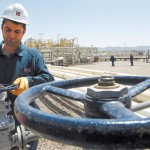Iraq Oil News: Iraq begins operating floating platform to gauge oil exports
 Iraq’s first floating platform to measure and control oil quantities exported from its southern ports has started operating in the Arab Gulf, the Iraqi Oil Ministry said last week.
Iraq’s first floating platform to measure and control oil quantities exported from its southern ports has started operating in the Arab Gulf, the Iraqi Oil Ministry said last week.
The platform, manufactured in Indonesia by an Italian company, arrived in Iraqi waters last month aboard a giant tanker.
The ministry’s engineering and technical staff offloaded the central counters platform from the tanker and installed it at its designated spot within Iraq’s territorial waters, Oil Ministry spokesman Assem Jihad told Mawtani.
“This platform, which is the first of its kind owned by Iraq, weighs 8,600 tonnes and stands 70 metres wide, 80 metres long and 16 metres in height,” Jihad said.
It contains advanced electronic systems and technological equipment to measure and control the quantities of oil exported from the southern ports via maritime oil tankers, he said.
Calculating quantities by using modern advanced counters is necessary to ensure standards of transparency, flexibility and accuracy are met in the export of oil to world markets, he said.
The platform’s operations are not restricted to measuring and controlling oil exports, but also help provide accurate data on the quantities of oil present in storage tanks, Jihad added.
“The previous system used to measure the volume of oil exports was outdated and not in step with new developments in export calculations operations,” said oil expert Abdul Ilah al-Amir of the office of the deputy prime minister for energy affairs.
The old system used a measuring tape installed in the storage tank or inside the filled tanker’s hull to measure the volume of exported oil, he added.
The new counters platform “will replace that primitive system and provide more accurate accounting data that conforms with the specifications and standards used worldwide and to the progress experienced by the country’s oil sector”, al-Amir told Mawtani.
STRATEGIC PROJECTS UNDER WAY IN EXPORT SECTOR
The new platform is one of several large strategic projects now under way in the oil export field, coinciding with oil production increases resulting from oil field development, al-Amir said.
These include “a project to build four floating terminals for oil export in Basra, with an export capacity of 900,000 barrels a day for each port”, he said.
Two of the new terminals are operating at full capacity, he said, while the other two are scheduled to be completed by the end of next year.
“By then, our export capacity from the southern outlets could reach up to more than six million barrels per day,” al-Amir said.
Iraq currently produces more than three million barrels of crude oil a day, he said, of which a daily average of 2.5 million are exported through its southern sea ports, through the Turkish port of Ceyhan on the Mediterranean, and through Jordan by tanker trucks.
Other projects to increase storage capacity include expanding and developing the present oil storage tanks, building new giant storage depots, pipelines and huge seabed lines to carry oil, and modernising compression and pumping networks, al-Amir said.
Modernising the oil exports measuring system is an important step as “it guarantees efficiency in measuring exported quantities, flexibility in controlling exports, and the ability to absorb increases in crude oil production”, said Qassim Mohammed Qassim of the parliamentary energy committee.
Qassim stressed the need to reinforce efforts to raise Iraq’s oil export capacity by “creating new export outlets”.
This could be achieved by building “additional ports, floating platforms and oil pipelines with neighbouring countries, especially in light of the developments taking place in the oil industry in terms of prospecting, exploration and extraction”, he added.
Source: Mawtani












